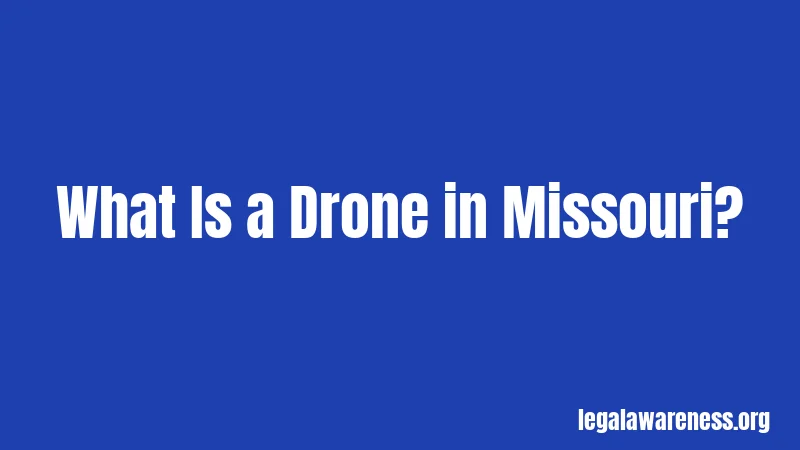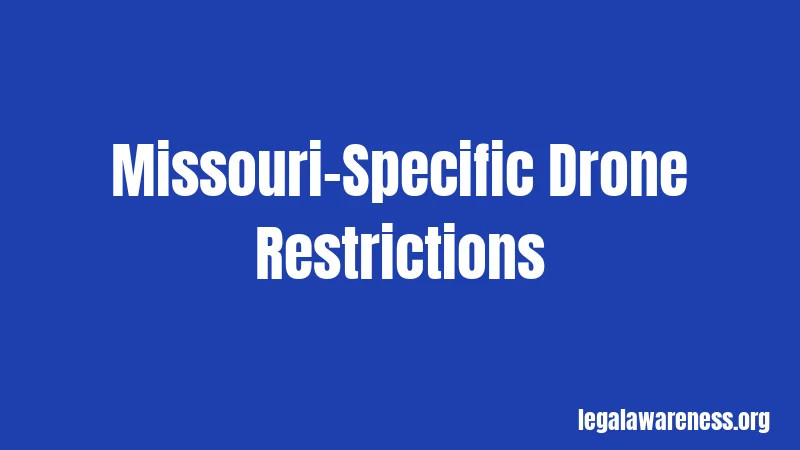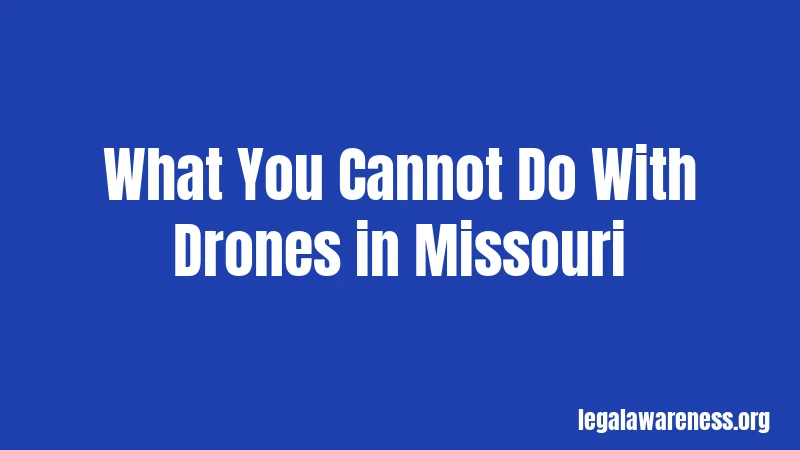Drone Laws in Missouri (2026): Navigate the Skies Legally
Most drone pilots don’t realize this. Missouri has almost no state-level drone laws. Seriously. But that doesn’t mean you can just fly anywhere you want. The rules are still strict, and the penalties can hit hard.
Here’s the deal. Missouri lets the federal government handle most drone regulations. But you still need to follow FAA rules, local city laws, and some specific Missouri restrictions. Get it wrong, and you could face fines up to $75,000. Let’s break down exactly what you need to know.
What Is a Drone in Missouri?

A drone is officially called an unmanned aircraft system (UAS). It’s any powered aerial vehicle that flies without a human pilot inside it. This includes your DJI Mavic, your FPV racing quad, and even larger commercial drones.
Missouri law doesn’t treat drones any differently than regular aircraft. The FAA considers your $500 hobby drone just as much an aircraft as a Boeing 737. That means similar rules apply.
Wondering if this applies to your tiny indoor drone? If it weighs more than 0.55 pounds, you need to register it. That’s about the weight of a baseball.
Basic Federal Drone Laws That Apply in Missouri
Registration Requirements
You must register your drone with the FAA if it weighs more than 0.55 pounds. Registration costs $5. It’s valid for three years.
The registration number must be visible on your drone. You can write it on the outside or put it in the battery compartment. Either way works fine.
Registration takes about five minutes online. You’ll get your number immediately. No excuse to skip this step.
The TRUST Test for Recreational Flyers
Flying for fun? You need to pass the TRUST test. It’s free and takes about 30 minutes.
The test is completely online. You can take it right from your phone. Most people pass on their first try.
Stay with me here. This isn’t optional. The FAA requires it for all recreational pilots. Even if you’ve been flying drones for years.
Part 107 License for Commercial Use
Making money with your drone? You need a Part 107 Remote Pilot Certificate. This applies to any flight where money changes hands.
Real estate photography counts as commercial. So does wedding videography. Even getting paid in trade or barter requires the license.
The Part 107 test costs $175. You must be at least 16 years old to take it. The pass rate is around 70% for people who study.
Missouri-Specific Drone Restrictions

Open-Air Facilities Ban
Missouri Section 577.800 prohibits drones near large venues. You cannot fly within 400 feet of altitude or property of an open-air facility.
What counts as an open-air facility? Any sports stadium, theater, or entertainment venue that holds 5,000 or more people and doesn’t have a complete roof.
Think Arrowhead Stadium or Busch Stadium. Flying near these places is illegal. The 400-foot rule applies both horizontally and vertically.
Prison and Correctional Facility Rules
Section 217.850 bans drones near prisons. You cannot fly over or near any correctional or penal institute in Missouri.
This makes sense, right? Drones have been used to smuggle contraband into prisons. Missouri takes this seriously.
The penalty for violating this can include both state and federal charges. Not worth the risk.
Surveillance and Privacy Laws
Missouri has proposed laws about using drones for surveillance. While not all have passed, you should know the rules.
You cannot use a drone to spy on people or property without permission. You cannot gather evidence of criminal activity without a warrant (unless you’re law enforcement with proper authorization).
Flying over someone’s backyard repeatedly? That’s not just creepy, it might be illegal. Respect people’s privacy.
Local Missouri Drone Laws
Jackson County Ordinance
Jackson County requires permits for flying drones in county parks. You must have liability insurance to get the permit.
The ordinance also limits noise levels. Your drone cannot exceed 98 decibels when measured from 50 feet away. That’s pretty loud, but racing drones can hit that level.
Honestly, this is the most restrictive local law in Missouri. If you’re flying in Jackson County parks, get that permit first.
St. Louis Forest Park Regulations
Want to fly in Forest Park? You need a Public Service Permit from City Hall.
The application requires three things. A copy of your pilot’s license. A description of your drone. Proof of insurance with $1 million coverage.
Yep, that’s right. One million dollars in coverage. Most hobby insurance policies won’t cut it.
Missouri Department of Conservation Areas
MDC conservation areas require special use permits for drone operations. The application process takes time, so plan ahead.
Here’s where it gets interesting. You can use a drone to recover wounded game animals without a permit. Black bear, deer, elk, and turkey are allowed. But you need prior authorization from a conservation agent.
Don’t fly your drone over wildlife just for fun. It creates stress that can seriously harm or kill animals.
What You Cannot Do With Drones in Missouri

Reckless or Careless Operation
Flying your drone dangerously is illegal. Period. This includes flying over crowds, near moving vehicles, or in any way that risks people’s safety.
The FAA can determine what counts as reckless. They’ve fined people for flying too close to helicopters, over stadiums, and near airports.
One pilot flew near a police helicopter during a search operation. That pilot faced a $32,700 fine. Not worth it.
Flying at Night Without Proper Equipment
You can fly at night, but only with anti-collision lighting. Your lights must flash between 40 and 100 times per minute.
Solid LED strips don’t count. They must actually strobe. The FAA is very specific about this requirement.
You also need updated night training if you’re a Part 107 pilot. Old certifications don’t automatically include night privileges.
Ignoring Airspace Restrictions
Missouri has controlled airspace around major airports. Kansas City International and Lambert-St. Louis International are the biggest.
You must get authorization before flying within five miles of a controlled airport. Use the FAA’s LAANC system for instant approval in many areas.
Flying near military bases is even more restricted. Whiteman Air Force Base has a no-fly zone that extends for miles.
Penalties and Consequences
Federal FAA Penalties
The FAA increased maximum fines in 2024. Civil penalties can now reach $75,000 per violation. That’s per violation, not total.
Most common violations result in smaller fines. Flying without registration might cost $1,000 to $27,500. Operating without a Part 107 certificate when required can cost $4,000 to $16,000.
The FAA doesn’t mess around. They’ve proposed over $341,000 in fines against 27 drone operators between October 2022 and June 2024.
Criminal Penalties
Serious violations can lead to criminal charges. These include fines up to $250,000 and up to three years in prison.
What triggers criminal charges? Interfering with aircraft, endangering people, or willfully violating regulations repeatedly.
One YouTuber named PhillyDroneLife racked up huge fines for repeated reckless flying. He became a cautionary tale in the drone community.
State and Local Penalties
St. Charles, Missouri, has specific penalties for drone violations. Fines range from $5 to $500 for breaking local ordinances.
Other cities might have their own penalties. Always check local laws before flying. Each municipality can set its own rules for city property.
License Suspension or Revocation
The FAA can suspend or permanently revoke your Part 107 certificate. This happens with serious violations or repeat offenses.
Losing your certificate means you cannot legally fly commercially. That’s a career-ender for professional drone pilots.
Pretty straightforward. Follow the rules or lose your privileges.
How to Fly Legally in Missouri
Before You Fly
Check these things before every flight. Is your drone registered? Do you have the required certification? Is the airspace clear?
Use the B4UFLY app. It’s free and shows you exactly where you can and cannot fly. The app updates in real time with temporary flight restrictions.
Look up local ordinances for the specific area. City websites usually have information about drone rules in parks and public spaces.
During Your Flight
Keep your drone within visual line of sight. This means you can see it with your naked eye, not just through FPV goggles.
Stay below 400 feet altitude. This is the general ceiling for drone operations unless you’re near a structure and staying within 400 feet of it.
Respect people’s privacy. Don’t hover over private property. Don’t film people without their permission.
After Your Flight
Document your flights if you’re flying commercially. Keep logs of when, where, and why you flew.
Report any incidents immediately. If your drone crashes or comes near another aircraft, report it to the FAA.
Stay current with regulations. Drone laws change frequently. What’s legal today might not be legal next year.
Remote ID Requirements
Remote ID became mandatory on March 16, 2024. Your drone must broadcast its location and identification information.
There are two ways to comply. Buy a drone with built-in Remote ID. Or attach an external Remote ID module to older drones.
Not sure what Remote ID is? Think of it like a digital license plate. It lets the FAA and law enforcement identify your drone remotely.
Some older drones don’t support Remote ID. You’ll need to buy a module or retire those drones. The FAA is serious about this requirement.
Insurance Recommendations
Missouri doesn’t require drone insurance for most operations. But you should seriously consider getting it.
Liability insurance protects you if your drone causes damage or injury. A $400 drone can cause thousands in damage if it crashes into a car or person.
Many policies cost less than $100 per year for recreational use. Commercial policies cost more but provide better coverage.
Jackson County requires insurance for park permits. St. Louis requires $1 million in coverage for Forest Park. Better to have it before you need it.
Proposed Missouri Legislation
Missouri lawmakers have filed bills to regulate drones more strictly. House Bills 209 and 210 were pre-filed for the 2025 legislative session.
These bills would require warrants for law enforcement drone surveillance. They’d ban drones manufactured by countries of concern like China.
Similar bills failed in previous years. But with growing drone concerns nationwide, future legislation might pass.
Stay informed about changes. What’s legal today could change if Missouri passes state-level drone laws.
Special Use Cases
Agricultural Drone Operations
Farmers using drones to spray crops need special authorization. You must have a Part 107 certificate plus a Part 137 exemption.
The Part 137 process involves submitting operational information to the FAA. It’s designed for agricultural aircraft operations.
This applies to drones over 55 pounds. Smaller agricultural drones follow regular Part 107 rules.
Law Enforcement Drones
Missouri has no state law limiting police drone use. Law enforcement can use drones without many restrictions.
This raised privacy concerns. But right now, Missouri doesn’t regulate how police departments use drones.
Federal law still applies. Police must follow FAA regulations even if state law doesn’t restrict them.
Educational and Research Use
Universities and research institutions have more flexibility. Missouri specifically exempts educational drone use in proposed legislation.
You still need FAA authorization. But educational institutions can often get COAs (Certificates of Authorization) for special operations.
Many Missouri universities have drone programs. They work directly with the FAA for research approval.
Where to Get Help
FAA Resources
The FAA website has everything you need. Register your drone at faadronezone.faa.gov. Take the TRUST test at multiple approved sites.
Schedule your Part 107 test through PSI testing centers. They’re located throughout Missouri in major cities.
The FAA hotline can answer questions about regulations. Don’t guess about rules. Call and ask.
Local Drone Communities
Missouri has active drone communities on social media. Facebook groups like “Missouri Drone Pilots” offer local advice.
Other pilots can tell you about local restrictions and good flying spots. They share experiences and help newcomers.
Join local clubs if you’re serious about the hobby. You’ll learn faster and avoid common mistakes.
Legal Assistance
Break the rules and get fined? Consider consulting an aviation lawyer. They specialize in FAA enforcement cases.
Some lawyers focus specifically on drone law. They understand the regulations and can help negotiate penalties.
Honestly, it’s better to follow the rules than need a lawyer. But if you face serious charges, get professional help.
Frequently Asked Questions
Do I need a license to fly a drone in Missouri?
You need a Part 107 certificate for commercial use. Recreational pilots need to pass the free TRUST test but don’t need a license.
Can I fly my drone in a Missouri state park?
It depends on the park. Many require special use permits from the Missouri Department of Conservation. Check before you fly.
What happens if I fly my drone illegally in Missouri?
You could face FAA fines up to $75,000 per violation. Criminal penalties can include prison time for serious violations. Local ordinances add additional penalties.
Is it legal to fly a drone over private property in Missouri?
Technically yes, but you cannot harass people or invade their privacy. Property owners can call police if you’re using your drone to spy or cause problems.
Do I need insurance to fly a drone in Missouri?
Not usually, but Jackson County and St. Louis require it for flying in certain parks. Insurance is highly recommended regardless.
Final Thoughts
Missouri keeps things simple with drone laws. The state mostly follows federal rules. But that doesn’t mean flying is a free-for-all.
Follow FAA regulations. Respect local ordinances. Don’t be reckless. These three rules will keep you out of trouble.
The drone industry is changing fast. Laws will probably get stricter, not looser. Stay informed about changes in your area.
Now you know the basics. Fly safe, fly legal, and enjoy your drone responsibly.
References
- Federal Aviation Administration – Drone Registration
- Missouri Revised Statutes – Section 577.800
- Missouri Revised Statutes – Section 217.850
- University of Missouri Extension – Drone Laws Publication
- Missouri Department of Conservation – Recreational Drone Flying
- FAA Enforcement Actions Against Drone Operators
